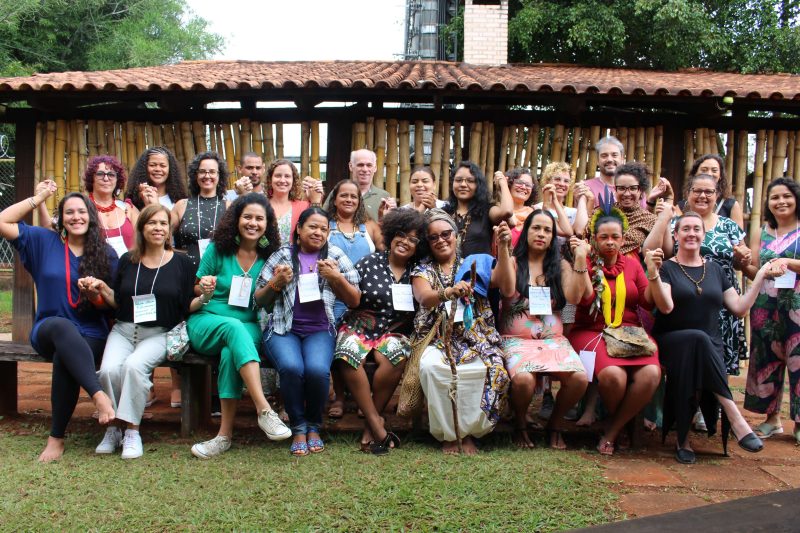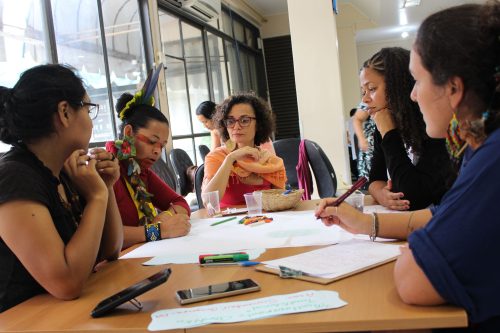Beyond Red Tape: Making Climate Finance Gender Just

As global discussions around climate finance intensify ahead of COP28, a pertinent call for “gender just climate finance” stands out. More than ever, it stresses the point that the call isn’t merely about funds; it’s a demand for true accessibility for grassroots women’s organizations. Yet, in the ever-evolving landscape of global climate negotiations around climate finance, voices from the frontlines, especially those from grassroots organizations and communities directly impacted by climate change, often find themselves overshadowed by the bureaucratic maze. Amidst this challenging backdrop, the Casa Socio-Environmental Fund has emerged as a significant advocate for localized environmental action and finance in South America.
Established in 2005, the Casa Socio-Environmental Fund has diligently woven a tapestry of environmental conservation, sustainability, democracy, socio-environmental rights, and social justice. Representing a beacon of hope and action, they proudly shared, “We were born to generate ties in the midst of a powerful network of change. We are here to unite local leaders and large global foundations.” At its core, the organization’s mission is expansive: to positively impact diverse territories by investing in those who guard them, bridging the gap between philanthropic bodies and grassroots communities. They have crafted a unique methodology that prioritizes the local dynamics of territories, ensuring that funds earmarked for change genuinely reach the hands that can mold the future.

With COP28 on the horizon, Casa’s goals are sharply defined. They aim to channel climate finance towards mechanisms that truly resonate with the ground realities. The organization is intent on spotlighting the historically intricate access that Global South communities have to funding resources. Emphasizing their purpose, they mentioned, “During COP28, we seek to present the funding opportunities already agreed upon, the barriers encountered, and the optimal mechanisms to ensure these crucial resources reach the local communities.”
Reflecting on their past engagements with the COP, Casa’s journey has been a blend of valuable insights and tangible frustrations. While the opportunity to connect with other civil society organizations and understand the intricate negotiation process has been enriching, the slow pace of commitments and their subsequent realization has often left them desiring more decisive action. “In Copenhagen, in 2009, an allocation of 100 billion dollars in annual contributions was agreed upon, to increment actions in several countries. At COP26 in Glasgow, pledges were announced to allocate resources for climate action with emphasis on the Global Forest Finance Pledge – GFFP, with approximately 12 billion dollars. Party Countries also indicated new financial commitments to the Adaptation Fund (more than US$ 350 million), and for the Least Developed Countries Fund, totaling US$600 billion, to help vulnerable communities to strengthen their resilience before adverse impacts of climate change. At COP27, a Fund for Loss and Damage was established. These relevant mechanisms, however, are not easily accessible by communities in the Global South,” they lament. “There is also an explicit recognition that local and indigenous communities face many difficulties to access financial support, and only a very small fraction of these funds reach these communities directly.”
However, Casa’s resilience shines through in their continued efforts to bridge the gap between grandiose international policies and the pressing local realities. A significant part of this message underscores the paramount role of Indigenous communities, especially women and youth, in the global climate discourse. In 2022, Casa proudly shared that around 73% of their donation budget went directly to these communities. “These communities play a crucial role in protecting forests and ecosystems,” they noted, emphasizing the need for more significant representation in global dialogues. They also underscore the importance of robust financial support for environmental defenders, believing in the gradual yet determined approach towards aligning global climate dialogues with grassroots imperatives, “It’s imperative that environmental defenders are supported financially and in strengthening their abilities and capacities to continue their rights defense work in a protected, secure and efficient manner.”

What does the broader conversation around gender just climate finance signify in this context? Here’s a perspective:
- Transparency, accessibility, and gender justice need to become the pillars of climate finance. It’s about redefining climate finance’s very foundations.
- For a genuine transformation in the global economic fabric, a shift from capitalistic profit-driven ideologies to prioritization of people over profit is imperative.
- Recognizing and acting upon the unique insights of grassroots women is critical. They bring solutions steeped in lived experiences, not theories.
- The idea isn’t to just allocate resources but to actively elevate grassroots women’s voices, strengthening them with the tools they need for impactful climate resilience.
- True ecosystem restoration is about more than planting trees. It embodies reshaping food systems, safeguarding community rights, and recognizing the pivotal role of women in these processes.
The time to act is now. As the limitations of global forums like COP28 become increasingly evident, Casa remains undeterred. Casa, in its dedication to the cause, prepares to actively participate in COP28, ensuring that issues like the accessibility of climate finance for grassroots communities are front and center. By influencing the philanthropic ecosystem, they aim to support systemic change, always striving to ensure that resources reach the forefront of planetary defense.
The message is clear: For transformative solutions to the climate crisis, bypassing bureaucracy and directly investing in grassroots communities is essential. It’s time the world heeds this call, prioritizing gender just climate finance, not as an afterthought but as an essential solution. Only then can the narrative move from mere discussions to actual, impactful action.
–
The Global Alliance for Green and Gender Action (GAGGA) will be present at COP28 with a delegation between November 30 to December 12, 2023. Join us at our side event “Gender Just Climate Policy & Finance: From Barriers to Actionable Solutions” on Sunday, 3 December, where we delve deep into themes central to this article. For collaboration opportunities and to learn more, please contact Noemi Grütter, GAGGA Co-Coordinator, Advocacy and Collaborations: n.grutter@fondocentroamericano.org. For additional insights around this article and Casa Socio-Environmental Fund’s work and to connect directly, reach out to Casa Fund Team at direcao@casa.org.br.
—
This story and GAGGA’s COP28 actions are supported by Global Affairs Canada and The Dutch Ministry of Foreign Affairs. Their contribution has been instrumental in GAGGA’s efforts to highlight critical issues and voices at COP28.



